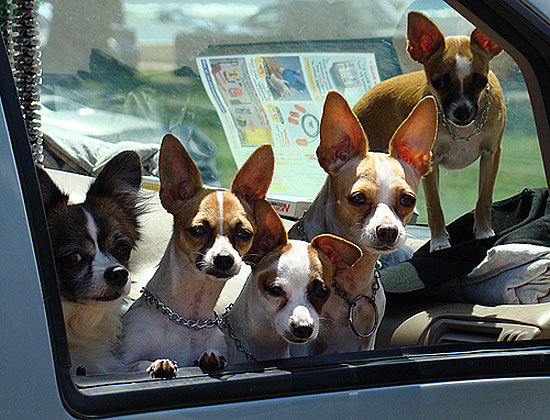
L.A. County dogs, especially small “fluffies” and Chihuahuas, are finding new homes around the country.
Los Angeles has plenty of big, famous exports: movies, food trends, celebrity gossip.
And at least one sought-after small one: the pint-sized rescue dog.
While dogs in Los Angeles County’s busy urban animal shelters can range from dachshunds to Saint Bernards, there’s an abundance of the little ones coveted by would-be adopters in other areas.
So a thriving pet transport circuit has sprung up. Since 2009, 3,457 L.A. County shelter dogs have found their way to Utah, Oregon, Montana, Colorado, Virginia and New York. Within California, they’ve hit the road for new homes in San Diego and Santa Cruz, with stops along the way at closer, less-crowded shelters in Irvine and Glendale. With 1,219 dogs transported so far this year, 2012 is the busiest yet for county canine relocations.
To land a quick home in another ZIP code, the transplanted L.A. dogs must be healthy, friendly and (generally) small. “Anything under 30 pounds, they’ll take. We could ship 5 Chihuahuas for every Labrador,” said Marcia Mayeda, the county’s director of Animal Care and Control. “It’s filling a void in their area.”
Because of the sheer size of its shelter population and the popularity of certain petite breeds here, Los Angeles County is able to share its canine wealth with places that have a shortage of adoptable small dogs.
The dog-moving operations have been funded by non-profit organizations like Best Friends Animal Society and the Heigl Foundation, established by actress Katherine Heigl.
Now the American Society for the Prevention of Cruelty to Animals is getting in on the act. With funding from New York philanthropist Carroll Petrie, ASPCA aims to save 16,600 dogs across the country in the next 8 months by helping to transport them out of crowded shelters. The Los Angeles County Board of Supervisors this week approved the county’s participation in the Carroll Petrie Foundation Dog Rescue Project. A subsidy of $50 per dog will allow the transfer of some 50 dogs a month from the county’s Downey Animal Care Center to the Mission Viejo Animal Services Department and, potentially, to other shelters as well.
The Chihuahua popularity boom—fostered by rampant media images of well-heeled pooches traveling around in celebutantes’ purses and stealing scenes in movies like Legally Blonde and Beverly Hills Chihuahua—contributed to overbreeding and a tiny-dog population explosion in L.A. and other California shelters in recent years. (On Tuesday, of the 1,521 dogs in Los Angeles County shelters, nearly a quarter—378—were Chihuahuas or Chihuahua mixes.)
Some highly-publicized relocation efforts, such as Project Flying Chihuahuas and Operation Chihuahua, have helped move hundreds of the little pooches from California to new homes around the country.
But now some areas are beginning to contend with a Chihuahua boom of their own, and have had to limit the number they accept.
Portland, for example, is “kind of saturated” with Chihuahuas these days, although the Oregon Humane Society still welcomes a twice-a-month shipment of other kinds of dogs from L.A., said Jennifer Barta, the agency’s “second chance” coordinator.
“Everybody here loves the L.A. dogs,” Barta said, marveling at how the transplanted pups endure “an incredibly long journey” yet still manage to come out wagging. “It’s just pretty phenomenal.”
Robin Harmon, “Pup My Ride” coordinator for the Best Friends group, has a good sense of what kinds of dogs are moving where.
A vanload of dogs that traveled from Los Angeles to Salt Lake City this week was “half Chihuahuas and a half what we call ‘fluffies’—poodle and terrier mixes,” Harmon said.
An upcoming shipment to New York, she said, will “probably have at least 30 Chihuahuas.” One of those L.A. expats will be going to the Hamptons, she said: “We’ve been laughing about that.”
An exception to the small dog rule: Billings, Montana, which Harmon said can be counted on to welcome four or five German Shepherds, along with other smaller dogs, from L.A. every couple of months.
Cats, alas, are another matter. “We are pretty well inundated with homeless cats of our own,” said Jessica Almeida of the Humane Society of Utah.
Even though the transport system can’t solve all the problems of homeless pets, redistributing the adoptable dog population makes it easier for conscientious consumers around the country to do the right thing when it comes to bringing home an animal.
“People want to go to a shelter,” said Mayeda, the county’s Animal Care and Control director. “They want to save a life.”

L.A. County shelters have plenty of Chihuahuas to share, but other areas, like Portland, are catching up.
Posted 9/19/12






